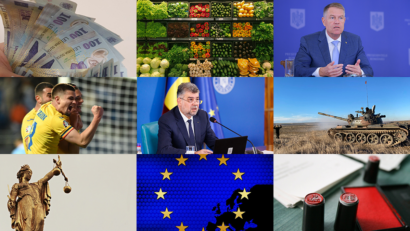The Week in Review May 14-20, 2022
A roundup of the week's top stories

Ştefan Stoica, 21.05.2022, 14:05
Big step towards energy independence
The Chamber of Deputies this week passed the offshore law, allowing for the exploitation of natural gas deposits in the Black Sea. Energy independence has been often debated in the context of the war, and is now closer to reality. This is what government officials have claimed this week. Unlike the previous version of the law, the current one is more investor-friendly and is expected to ensure profits to both companies and the state. Energy Minister Virgil Popescu said the new regulations ensure stability, predictability and an investor-friendly taxing environment, as well as lower gas prices for household users. USR in the opposition voted the law, although it preferred the profits obtained from the exploitation to be directed to the privately administered pension fund. The only party in Parliament that voted against the law was the ultranationalist AUR party. The new law will allow the government to intervene in situations of energy crisis and redirect production to cover domestic consumption.
The economy – under pressure
Romania had the biggest economic growth rate at EU level – 5.2% in the first three months of 2022 compared to the first quarter of last year. The good news came from the Eurostat and confirmed data previously published by the National Statistics Institute. The long-term forecast is however grim. According to the European Commission, after the robust growth reported in 2021, Romanian economy is expected to slow down to 2.6% this year, considering that inflation is cutting available revenues and the war in Ukraine affects confidence in the economy, supply chains and investments. In February, prior to the invasion, the Commission estimated Romanian economy to grow by 4.2% this year. The Commission also downgraded its estimate on economic growth in 2023, when the GDP is expected to grow only by 3.6%. The European Commission has increased its inflation forecast for this year, from 5.3% to 8.9%. Inflation is expected to drop to 5% in 2023. The budget deficit and debt are also expected to go up, the Commission warns. Commission experts use the stagflation to describe the current economic context in Romania, namely a high and persistent inflation rate and unfortunately overlaps with a weak and stagnating economy.
Measures from the support package for Romanians
The increase in pensions and allowances for children, the reduction of social contributions, the scheme for capping energy bill prices for household and non-household consumers, the Support for Romania program, all these could only lead to an accelerated emptying of the treasury. On alert, the Social Democrats in the governing coalition believe that its high time they returned to progressive taxation, but their Liberal partners dont even think about giving up the flat income tax. The topic is currently on the coalition agenda. Until a decision is made, two more measures from the “Support for Romania” program will be implemented. An emergency ordinance adopted on Wednesday allows private companies to voluntarily increase the minimum wage by 200 lei (about 40 Euros). The increase will take effect as of June 1st and will be exempted from tax and social contributions payment. The second measure is aimed at compensating for the increase in the fuel price for road hauliers and passenger transporters. 3,000 companies in the field will benefit from state aid.
On Finlands and Swedens NATO accession and the consolidation of the eastern flank
Romania hailed the wish of Finland and Sweden to join the North-Atlantic Alliance. President Klaus Iohannis said he would support them in the accession process and expressed his conviction that, once the two states join the NATO family, the Alliance would be stronger. In his turn, the PM Nicolae Ciucă said that the current context, in which Russia violated any norm of international law and resorted to armed aggression against a sovereign and independent state, made the two countries decide to become members of an alliance that has proved its defensive character, its spirit of solidarity, its unity, solidity and determination to do everything possible to defend every inch of the territory of the member states. After the two northern states join NATO, the most exposed Allied flank remains the eastern one, especially its southern part. Prime Minister Ciucă and his Portuguese counterpart Antonio Costa discussed this flanks consolidation in Bucharest. The two visited a training battalion in southern Romania where about 200 troops from Portugal are being trained. They have been deployed this year to strengthen NATOs South-Eastern Flank. The Allies have sent a strong message to Russia: an attack against an ally is seen as an attack against all of us, Prime Minister Costa underlined. The Romanian and Portuguese Defense Ministers signed a bilateral agreement on defense cooperation in Bucharest on Thursday.
Romanian filmmakers in Cannes
The Romanian director Cristian Mungiu returns to Cannes with the film “R.M.N.”, which will compete for the Palme dOr Prize in the official competition. Mungiu received the big trophy in 2007, for his film 4 months, 3 weeks and 2 days, alongside two more awards, for best script and best director, respectively. Another two Romanian films will be presented, for the first time, at the 75th edition of the Cannes International Film Festival, which is underway, but in different sections: “Metronome”, by Alexandru Belc and the short film “The Potemkinists”, directed by Radu Jude. Also involved in this edition of the festival are the producer Diana Păroiu and the actress Cosmina Stratan, who 10 years ago, received the best actress award for her performance in Mungius film Beyond the Hills. (VP&LS)




























